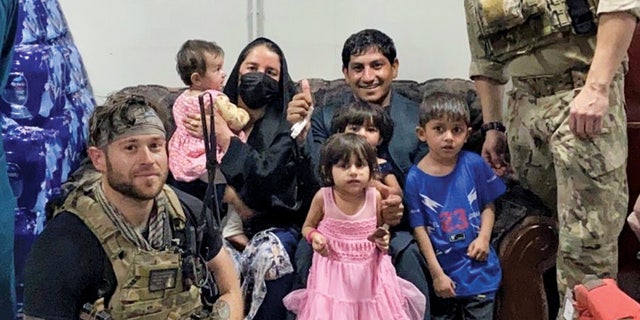‘Real injustice’: Marine says Afghan interpreter denied visa to stay in US despite meeting requirements
An Afghan interpreter whose family was rescued from the chaos outside Kabul’s airport in August 2021 may not be able to stay in the United States after his visa was denied. The Marine Corps major he served alongside called the reasoning behind the decision “bewildering.”
“I am deeply disappointed and sad for my friend that he’s still going through this crap,” Marine Corps Maj. Tom Schueman told Fox News. “It’s a real injustice.”
30 RETIRED MILITARY LEADERS URGE CONGRESS TO PASS AFGHAN ADJUSTMENT ACT BEFORE THE NEW YEAR
Schueman co-authored the book “Always Faithful” with his former interpreter Zainullah Zaki — known as “Zak” by the Marines he served with. It chronicled how the pair formed a lifelong bond amid the deadliest Marine deployment of the war in Afghanistan and how Schueman worked round-the-clock to ensure Zak and his family made it out of Kabul as the Taliban closed in.
But earlier this month, Schueman got word that Zak’s special immigrant visa (SIV) had been denied. The rejection letter lists insufficient length of employment as the reason.
Interpreters must have served 12 months for the U.S. government or the International Security Assistance Force to qualify for the visa. Zak served for about 31 months, according to letters from supervisors submitted with his visa application and shared with Fox News.
“It really does not make any sense how they’re saying it’s insufficient time,” Schueman said. “It’s puzzling, bewildering.”
MARINE OFFICER SAYS AMERICA HAS NOT HONORED ITS PROMISE TO AFGHAN INTERPRETER:
WATCH MORE FOX NEWS DIGITAL ORIGINALS HERE
Zak joined the men of 3rd Battalion, 5th Marines as an interpreter in 2010. Aside from being a gifted linguist, Schueman said the young man quickly went above and beyond, putting his own life at risk for the American forces on multiple occasions.
He picked up a rifle and held security when Marines were injured and sprinted through a minefield when he knew the Taliban were about to ambush, Schueman said.
“He was there when I was injured to help pick me up,” he said. “He quickly went from someone who just translated for us to becoming a member of the platoon.”
Schueman helped his interpreter start the SIV process six years ago after the Taliban started threatening Zak, even allegedly poisoning his meal at a restaurant.
“He loves Afghanistan,” Schueman said. “He never wanted to leave until it became so insufferable, until the persecution became so relentless that he had no alternative.”

But like so many others, Zak got caught in a bureaucratic nightmare. Despite Schueman’s pleas to Congress and a vow from Secretary of State Antony Blinken to make his case a priority, Zak’s visa was still in limbo when the Taliban took Kabul in 2021.
After a harrowing escape from the capital city, Zak, his wife and four young children settled in San Antonio, Texas.
“He loves San Antonio,” Schueman said, adding that Zak has assimilated well and is proud to talk about the parks and restaurants and community he has found in his new home.
Zak typically works seven days a week hanging drywall at a cancer hospital — physically demanding work that only pays minimum wage, Schueman said. But the job supports Zak’s family, which has grown by another son.
“His kids are under the belief that they’re growing up as Americans,” Schueman said. “That their father made sacrifices, that they’ve earned a right to be here.”
HEAR FROM A GOLD STAR SISTER ON THE IMPORTANCE OF PROTECTING U.S.-AFGHAN ALLIES:
AFGHANS RESETTLING IN US STRUGGLE TO FIND AFFORDABLE HOUSING
Schueman said he and Zak are still weighing their next options. The visa denial letter stated there is no further appeal of the decision, but that Zak may submit a new application if he feels there was an error. After six years of working their way through the visa process, Schueman said that prospect is unappealing.
“That’s the big kind of issue with this process, is that there is no human in the loop,” he said. “There is a human somewhere, but you never get to interface with that person. You interface with a sterile email that rejects you and doesn’t offer you an opportunity to inquire, to discuss.”
A spokesperson for the State Department declined to comment on Zak’s case citing confidentiality and did not offer insight more broadly as to why an applicant might receive such a denial.
Schueman said they may file for asylum if that’s Zak’s only option.
“It’s very clear that if he went back to Afghanistan that he would be killed,” he said. “So that’s not acceptable.”
To hear more about the SIV challenges, click here.
Ramiro Vargas contributed to the accompanying video.
Read the full article Here


